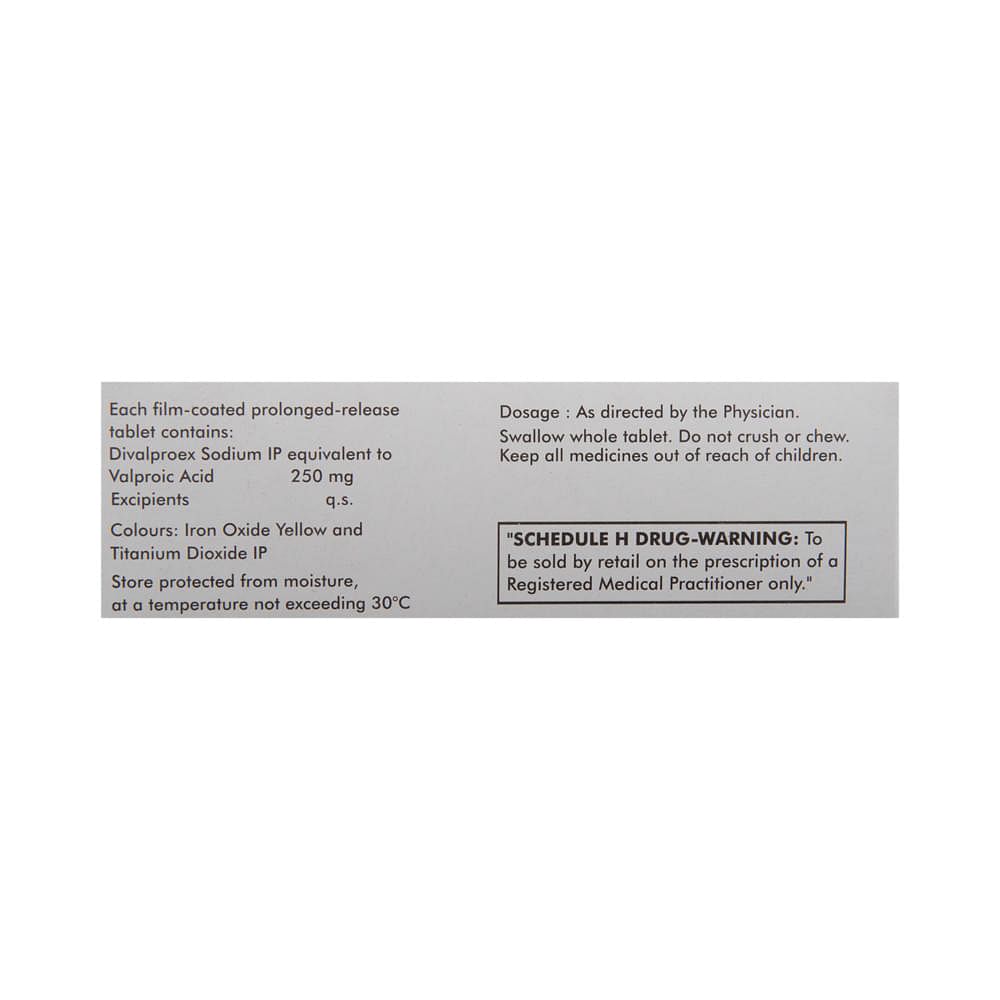
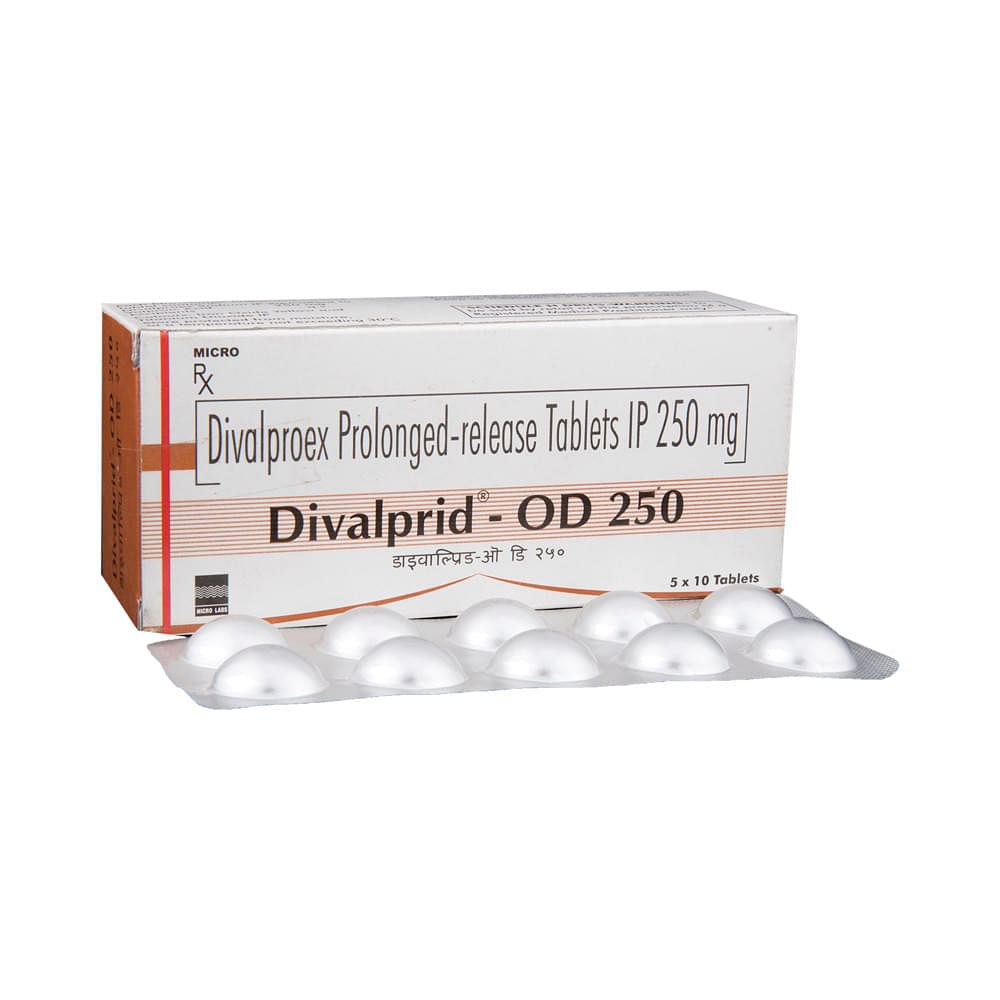


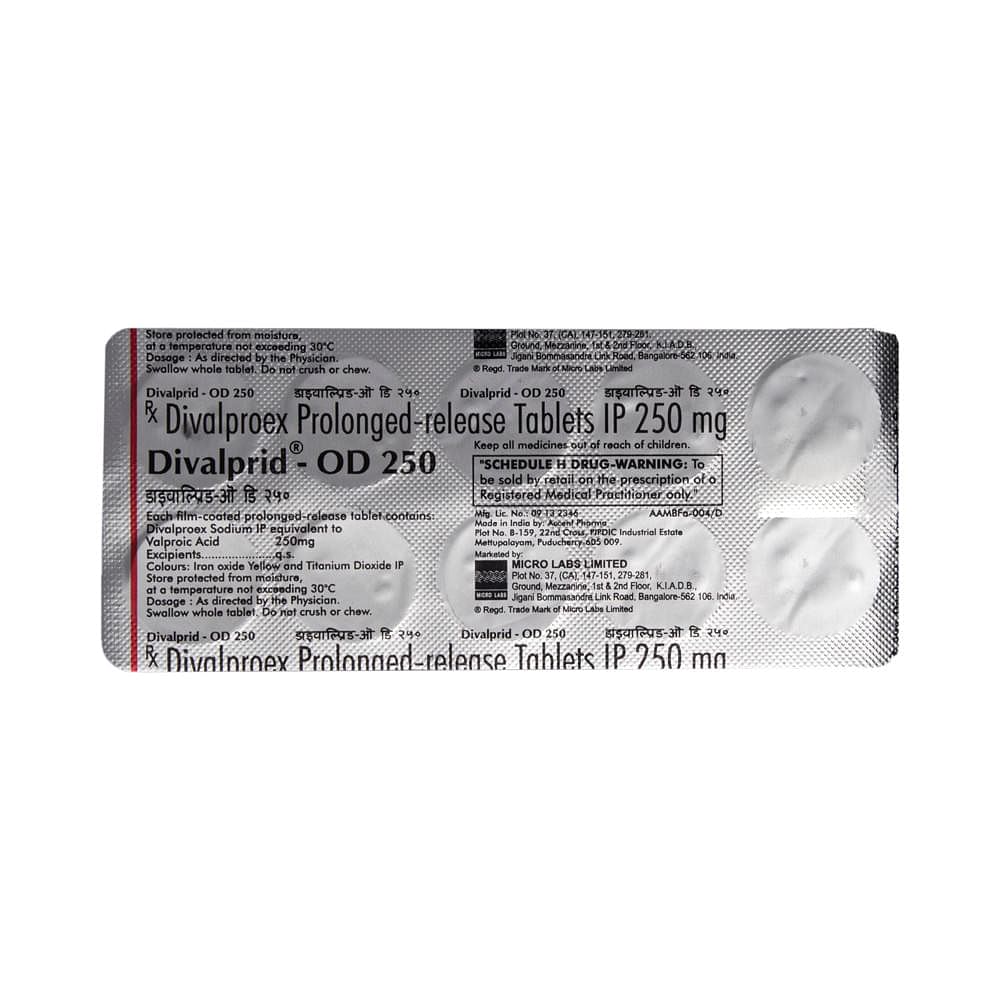

Divalprid-OD 250 Tablet
Manufacturer
Micro Labs Ltd
Salt Composition
Divalproex (250mg)
Key Information
Short Description
Divalprid-OD 250 Tablet PR is used to treat epilepsy, prevent migraines, and occasionally treat bipolar disorder.
Dosage Form
Tablet PR
Introduction
Divalprid-OD 250 Tablet PR may be used alone or in combination with other medicines. The dose and frequency will be decided by your doctor to control your symptoms effectively. It can be taken with or without food but should be taken at the same time each day. It usually takes a couple of weeks to work, and it is important to take it regularly and for as long as advised. Missing doses may trigger seizures, and stopping suddenly can worsen your condition. Common side effects include headache, blurred vision, nausea, vomiting, dizziness, tiredness, unsteadiness, bruising, and decreased body temperature. Long-term use can cause osteoporosis and increase the risk of fractures. Rarely, it may lead to suicidal thoughts. Inform your doctor if you have heart problems, kidney or liver disease, difficulty urinating, depression, or suicidal thoughts. Avoid alcohol as it can increase side effects and seizure risk. Frequent blood tests may be needed to ensure the correct dose.
Directions for Use
Use as advised by your doctor or check the label for directions. It may be taken with or without food but is better taken at a fixed time.
Safety Information
Side Effects
Headache Blurred vision Nausea Vomiting Dizziness Tiredness Unsteadiness Bruising Decreased body temperature
Alcohol Warning
Divalprid-OD 250 Tablet PR may cause excessive drowsiness with alcohol.
Breastfeeding Warning
Divalprid-OD 250 Tablet PR is safe to use during breastfeeding. Human studies suggest that the drug does not pass into breastmilk in significant amounts and is not harmful to the baby.
Pregnancy Warning
Divalprid-OD 250 Tablet PR is unsafe to use during pregnancy due to definite evidence of risk to the developing baby. Consult your doctor.
Interacting Medicines
Alprazolam Chlordiazepoxide Clobazam Clonazepam
How it works
Divalprid-OD 250 Tablet PR is an antiepileptic medication that controls seizures by decreasing the abnormal and excessive activity of nerve cells in the brain.
Quick Tips
Take your medication regularly as directed by your doctor. It can be taken with or without food but better with food to avoid stomach upset. Do not change the brand of your medicine and ensure you have enough supply. Practice yoga, get enough sleep, limit screen time, and take your medication on time to prevent seizures. It may cause dizziness and sleepiness; avoid driving or activities requiring mental focus until you know how it affects you. Monitor your weight during treatment as it can cause weight gain. Your doctor may conduct regular blood tests to monitor the medication's effects. Inform your doctor if you notice yellowing of eyes or skin, dark urine, or stomach pain. Do not stop taking the medication suddenly without consulting your doctor as it may increase seizure frequency.
Related Medicines

Divaxee OD 250 Tablet ER

Valance OD 250 Tablet
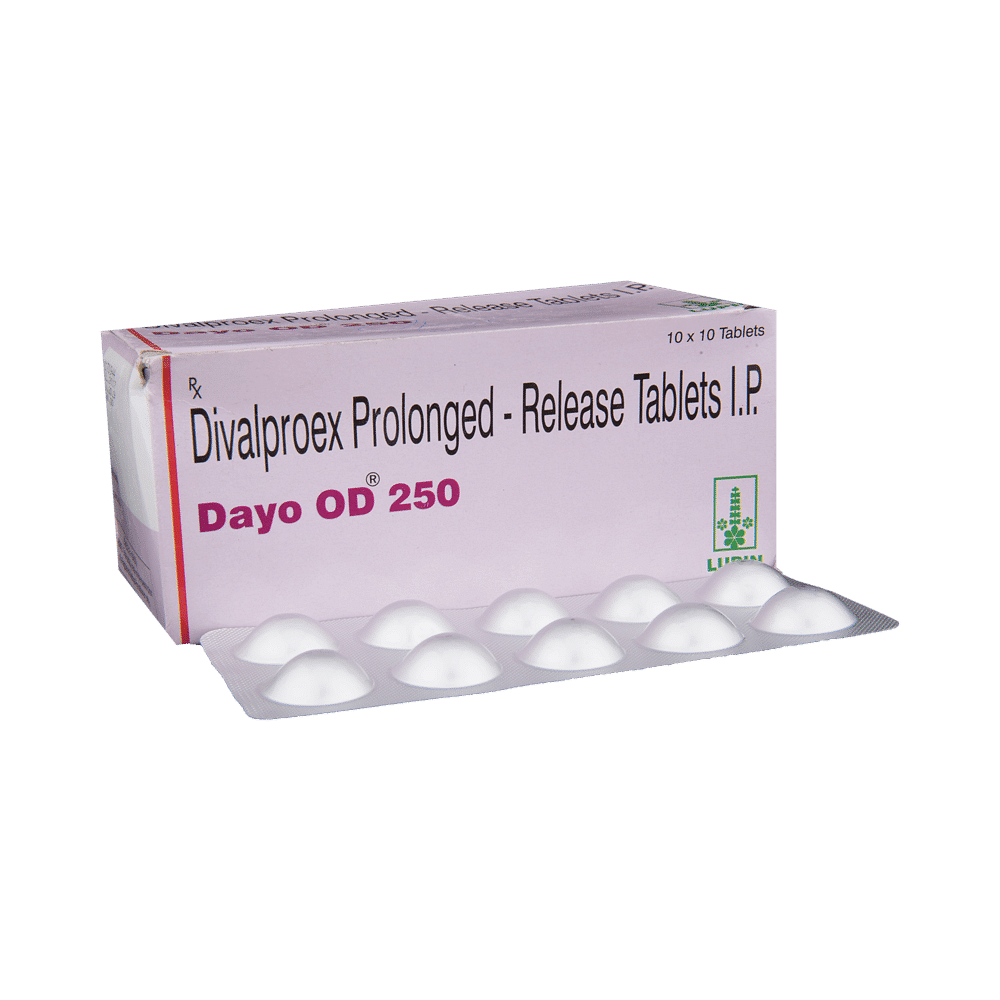
Dayo OD 250 Tablet PR
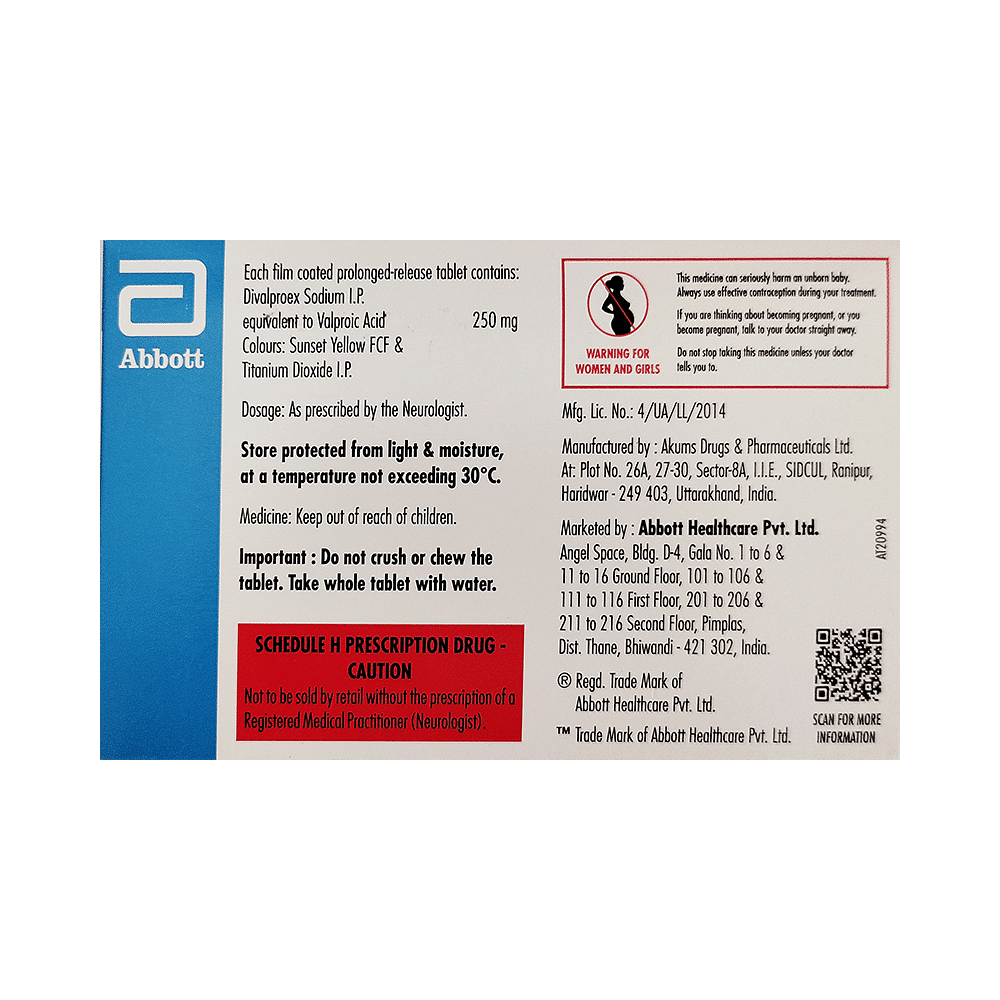
Valance OD 250 Eazy Glide Tablet

Divalrate ER 250 Tablet

Divay OD 250mg Tablet PR

Dilpra-OD 250 Tablet PR
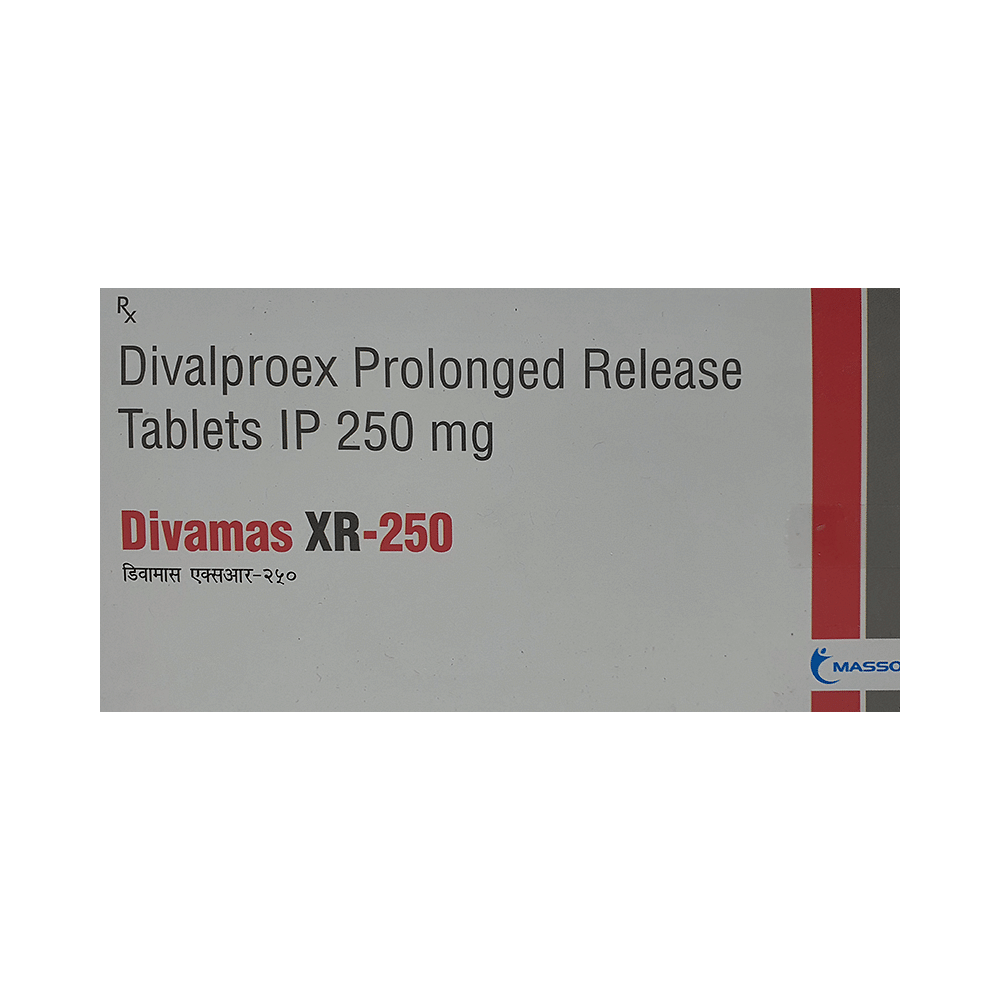
Divamas XR 250 Tablet

Dvs OD 250mg Tablet PR

Davproex 250 Tablet PR
Frequently asked questions
What happens if I stop taking Divalprid-OD 250 Tablet PR?
It is essential to consult your doctor before stopping Divalprid-OD 250 Tablet PR. Gradually reducing the dose under the supervision of a doctor or specialist is recommended. Suddenly stopping the medication may lead to the recurrence of symptoms, irritability, anxiety, dizziness, and tremors.
Is Divalprid-OD 250 Tablet PR a mood stabilizer?
Yes, Divalprid-OD 250 Tablet PR can be used as a mood stabilizer in patients who experience rapid mood changes. It works by calming the hyperactivity of the brain during mood changes.
Can Divalprid-OD 250 Tablet PR cause weight gain?
Yes, Divalprid-OD 250 Tablet PR may cause weight gain due to increased hunger. Regular diet and exercise can help prevent weight gain. If you have concerns about weight gain, consult your doctor.
Does Divalprid-OD 250 Tablet PR make you sleepy?
Yes, Divalprid-OD 250 Tablet PR may cause drowsiness. Avoid driving or performing tasks that require mental focus until you know how it affects you.
Does Divalprid-OD 250 Tablet PR cause hair loss?
Yes, Divalprid-OD 250 Tablet PR may cause temporary hair loss, which is usually dose-related. Consult your doctor if the hair loss bothers you or persists for a longer duration.
Can Divalprid-OD 250 Tablet PR damage my liver?
Yes, Divalprid-OD 250 Tablet PR can cause liver damage, particularly during the first 6 months of treatment. Symptoms may include nausea, vomiting, loss of appetite, stomach pain, dark-colored urine, facial swelling, and yellowing of the skin or eyes. It is essential to have liver function tests done before starting treatment and periodically during the first 6 months of therapy, especially in those at risk or with a prior history of liver disease.
Can I take alcohol while I am taking Divalprid-OD 250 Tablet PR?
Avoid consuming alcohol while taking Divalprid-OD 250 Tablet PR, as it may increase drowsiness, lightheadedness, or dizziness.
What are the laboratory tests recommended prior to taking Divalprid-OD 250 Tablet PR?
Your doctor may recommend blood tests before starting treatment with Divalprid-OD 250 Tablet PR, including blood cell count, bleeding time, and coagulation tests. Liver function tests are also advised before therapy, and periodic monitoring is recommended during the first 6 months of therapy, primarily in those at risk or with a prior history of liver disease.
What should be done if I start experiencing abdominal pain, nausea, and anorexia?
If you experience acute severe abdominal pain along with nausea and vomiting, it may be due to pancreatitis. Consult your doctor immediately, and your doctor may check your serum amylase levels. If the test shows positive results for pancreatitis, the medication should be stopped immediately.
How to check for overdose of Divalprid-OD 250 Tablet PR?
Overdose of Divalprid-OD 250 Tablet PR may cause headaches, blurred vision, lack of reflexes, confusion, and tiredness. You may also experience weak or 'floppy' muscles, fits (seizures), loss of consciousness, behavioral changes, and breathing difficulties such as fast breathing, shortness of breath, or chest pain. Seek immediate medical assistance in case of overdose.


